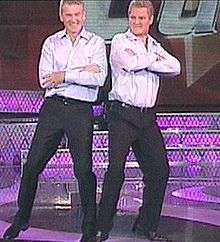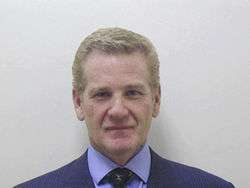Francisco de Narváez
| Francisco de Narváez | |
|---|---|
|
Francisco de Narváez in 2008 | |
| Preceded by | Néstor Kirchner |
| Member of the Argentine Chamber of Deputies | |
|
Assumed office June 28, 2009 | |
| Personal details | |
| Born |
Francisco de Narváez September 22, 1953 Bogotá, Colombia |
| Nationality | Argentinian |
| Spouse(s) | Agustina Ayllón |
| Residence | Luján, Buenos Aires, Argentina |
| Occupation | Entrepreneur and Politician |
| Net worth | $500 million |
| Website | Official website |
Francisco de Narváez Steuer (born 22 September 1953 in Bogotá), known as El Colorado or Pancho, is a Colombian-born naturalized Argentine businessman, politician who ran for governor of Buenos Aires Province on the PRO ballot in the 2007 elections in Argentina. He is currently a member of the Argentine Chamber of Deputies.
Business life
De Narváez arrived in Argentina at the age of three. His father was a Colombian coffee merchant. His mother's family owned the Almacenes Tía chain of supermarkets, started by his grandfather, Karel Steuer, in Eastern Europe as 'Te-Ta'. Upon relocating to South America, it became a major chain. De Narváez began work there at the age of 17 years and was appointed Chief Executive in 1989, a position which he held for ten years.[1] De Narváez eventually sold the Argentinean division of the company in 2002[2] for $638 million.[3]
In 2002, his group bought 50% of La Rural, a major and historic exhibitions centre, and the additional 50% in 2005.[4] In 2007 he bought one of Argentina's most important TV stations, América TV. He owns 20% of the El Cronista Comercial.[5][6] In 1983, de Narváez took Argentine citizenship to vote for Raúl Alfonsín. His nickname in business and politics is "El Colorado", and his personal fortune has been estimated to be in excess of $500 million.[7]
Political life
Following the 2001 crisis, he decided to enter politics and joined the Justicialist Party. He aided the presidential campaign of Carlos Menem in 2003 as a candidate for the position of Minister of Social Development.[2] De Narváez ran from the political left, commenting that in office he would be a staunch welfarist.[8] In July 2004 he then self-financed major commemorations around Argentina to celebrate the 30th anniversary of Peron's death.[9]
Francisco de Narváez was elected as a National Deputy for Buenos Aires Province in 2005, the first foreigner to be elected to the Chamber. In 2006 de Narváez took the side of agriculture workers against the Argentinian government over efforts to either ban certain meat exports.[10] He has also spoken out about the nationalization of private industry in many other areas of governance.[11]

As a centre-right pro business politician, he supported the senatorial bid of Hilda de Duhalde and sits with dissident Peronists in Congress, opposed to the government of the Kirchners.[12] He stood to be governor of the province in 2007, gaining over a million votes. Jorge Macri, cousin of Mauricio Macri, was his running mate and their campaign was supported by Macri's party Commitment to Change and the PRO coalition. De Narváez mentioned to the press in November 2012 that he would be interested in forming a similar coalition in the upcoming 2013 election season as well.[13] During his campaigns, de Narváez is known for self-financing his campaigns, using his own money to pursue his political interests.[14]
On June 28, 2009, de Narváez defeated former president Nestór Kirchner in the legislative midterm elections in the province of Buenos Aires. During the electoral campaign he took part of the humoristic TV show Gran Cuñado, which included parodies of the most important politicians of Argentina (including De Narváez himself), and engaged with his parody in stage jokes. This act generated controversy in the media about the effects on his actual electoral performance: columnists like Joaquín Morales Solá claim he was benefited from it,[15] while other think that such influence was relative.[16] Francisco de Narváez says that Gran Cuñado helped him,[17] and that it helped to humanize the image of politicians.[18] He also ran the campaign in Buenos Aires as part of a political alliance between himself, Chief of Government of the City of Buenos Aires Mauricio Macri and former Governor of Buenos Aires Felipe Solá.[19]
In 2010 de Narváez introduced a bill to the Argentinian legislature to increase the universal child allowance from 180 pesos to 250. The bill was targeted at alleviating child poverty, and to correlate the allowance with wage inflation.[20] In 2011 de Narváez ran for office with the UDESO as a gubernatorial candidate in the Buenoes Aires province.[21]
In October 2012 de Narváez began national calls for the formation of a new coalition to remove the majority coalition from power in Argentina, naming Peronist dissidents, the PRO, and others as potential members of a new ruling coalition.[22] He has been particularly critical of the national government in its handling of civil security and the country's problem with crime.[23]
Personal life
His second wife is former model Agustina Ayllón with whom he has three children.[24]
References
- ↑ "Bio". Retrieved November 14, 2012.
- 1 2 Daniel Leñini (November 27, 2005). "Francisco de Narváez: "Macri no cree en los partidos políticos tradicionales y yo sí"". Grupo Derf. Retrieved November 14, 2012.
- ↑ "Francisco De Narváez: "No voy a votar a Kirchner"". Perfil. May 13, 2007. Retrieved November 14, 2012.
- ↑ "De Narváez, dueño de Rural SA". April 23, 2005. Retrieved November 14, 2012.
- ↑ ¿Quién es Francisco de Narváez? (Spanish)
- ↑ Robert T. Buckman (2012). Latin America 2012 46 Ed. Rowman & Littlefield. p. 56. Retrieved November 14, 2012.
- ↑ "Francisco de Narváez: el millonario que saltó del PJ a candidato de Macri". Clarín. September 9, 2007. Retrieved November 14, 2012.
- ↑ Raúl Dellatorre (September 26, 2006). "El pragmático De Narváez se quedó con "El Cronista"". Página/12. Retrieved November 14, 2012.
- ↑ De Narváez Steuer (June 3, 2010). "BIOGRAFÍA DE FRANCISCO DE NARVÁEZ STEUER. MACRI, VARSVACKI Y EL CONSEJO JUDÍO MUNDIAL". Retrieved November 14, 2012.
- ↑ "Francisco De Narváez: "El Gobierno recibió en Misiones un tsunami de votos"". Nova. December 8, 2006. Retrieved November 14, 2012.
- ↑ "Francisco De Narváez amanece repartiendo boletas". Día a Día. June 26, 2009. Retrieved November 14, 2012.
- ↑ Peronismo Ca$h (Spanish)
- ↑ "De Narváez apoyará una eventual candidatura de Macri en la provincia". La Nación. November 7, 2012. Retrieved November 14, 2012.
- ↑ Mario Fiore (July 12, 2009). "Los negocios políticos y económicos de De Narváez en Mendoza". Los Andes. Retrieved November 14, 2012.
- ↑ La sátira que desnuda un vacío de ideas (Spanish)
- ↑ El efecto de Gran Cuñado sobre la intención de voto (Spanish)
- ↑ De Narváez: “Tengo más plata que los Kirchner” (Spanish)
- ↑ La visita de De Narváez a "Gran Cuñado", al ritmo del reggaeton (Spanish)
- ↑ "Acuerdo entre Solá, Macri y Narváez de cara a octubre". La Nación. February 11, 2009. Retrieved November 14, 2012.
- ↑ "Francisco De Narváez impulsa un proyecto para que la Asignación por Hijo pase a 250 pesos". Diario La Nueva Provincia. July 8, 2010. Retrieved November 14, 2012.
- ↑ "Elecciones 2011: De Narváez apunta a aglutinar a la oposición". La Noticia 1. October 3, 2011. Retrieved April 25, 2013.
- ↑ "De Narváez pide un frente de unidad nacional". Diario La Capital. October 27, 2012. Retrieved November 14, 2012.
- ↑ "La inseguridad es una realidad y un problema nacional". Minutouno. November 12, 2012. Retrieved November 14, 2012.
- ↑ Francisco de Narváez: el millonario que saltó del PJ a candidato de Macri (Spanish)
External links
| Wikimedia Commons has media related to Francisco de Narváez. |
